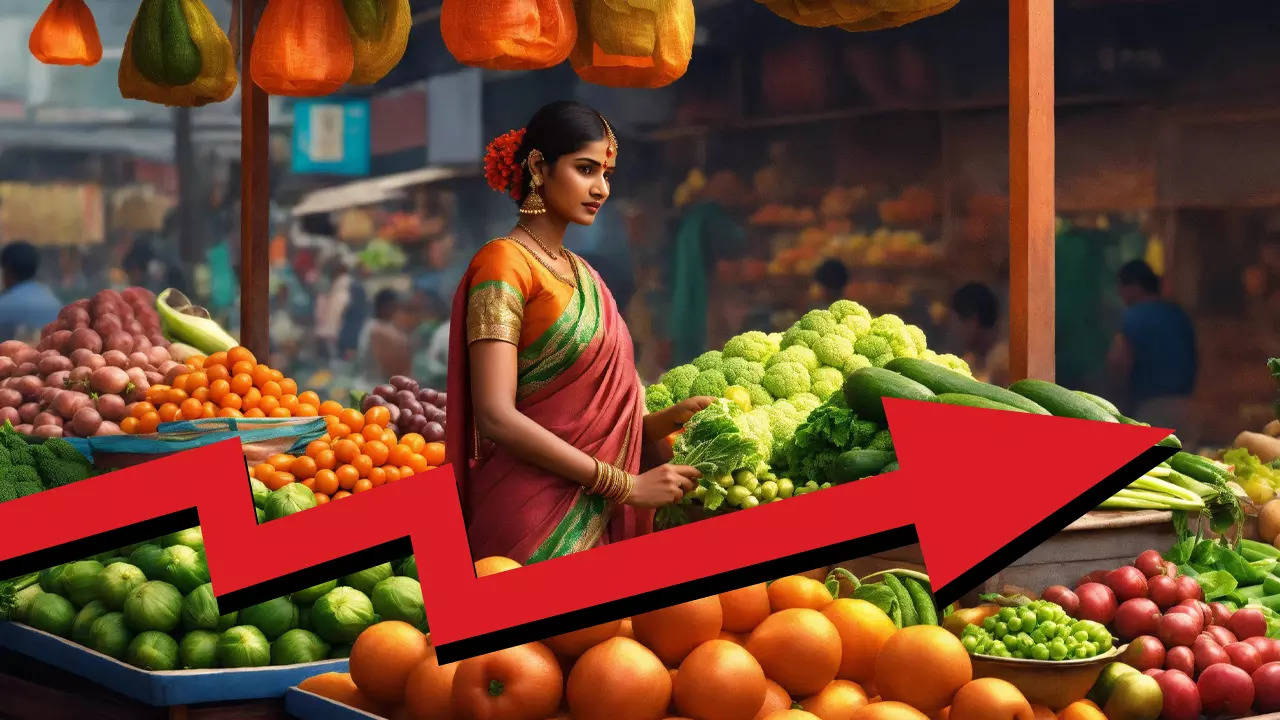India’s retail inflation eased to a three month low of 5.10% in January 2024, showed data from the Ministry of Statistics and Programme Implementation. According to the government data, the Consumer Price Index (CPI) inflation rural stood at 5.34% and the CPI urban was at 4.92%. The combined CPI inflation for January 2024 stood at 5.10%. The final CPI data for December 2023 came in at 5.69%.
In January, food inflation, comprising nearly half of the overall consumer price basket, stood at 8.30%, down from 9.53% in December.
Economist Vivek Kumar from Quanteco Research noted that with favorable seasonal support from food, disinflation in fuel, and subdued core inflation drivers, headline CPI inflation moderated to a 3-month low in Jan-24. The trajectory of moderation could persist if food price pressures remain contained in the near term. However, climate risks and potential adverse spillover from escalation in merchandise trade costs post the Red Sea disturbance may introduce volatility in food prices,” he told Reuters.
Meanwhile, the Reserve Bank of India, maintaining its repo rate at 6.50% for the sixth consecutive meeting on February 8, underscored “large and repetitive food price shocks” as a significant risk to the ongoing disinflation trend.
“Headline inflation, after moderating to 4.9 per cent in October, rose to 5.7 per cent in December 2023. This was primarily due to food inflation, mostly vegetables. The softening in core inflation (CPI inflation excluding food and fuel) continued across both goods and services, reflecting the cumulative impact of monetary policy actions as well as significant softening in commodity prices. The uncertainties in food prices, however, continue to impinge on the headline inflation trajectory,” RBI governor Shaktikanta Das said in his monetary policy statement.
“The MPC will carefully monitor any signs of generalisation of food price pressures which can fritter away the gains in easing of core inflation. Monetary policy must continue to be actively disinflationary to align inflation to the target of 4 per cent on a durable basis. The MPC will remain resolute in this commitment,” he added.
Economists surveyed by Reuters anticipated that India’s retail inflation eased to a three-month low of 5.09% in January. A separate Reuters poll indicated that inflation would average 5.4% this fiscal year and 4.7% in the next, aligning closely with the RBI’s forecasts of 5.4% and 4.5%.
However, the RBI is expected to maintain its key policy rate unchanged until at least end-June before considering a 25 basis points cut in each of the third and fourth quarters, a relatively modest move compared with expectations for other global central banks’ easing cycles.
In January, food inflation, comprising nearly half of the overall consumer price basket, stood at 8.30%, down from 9.53% in December.
Economist Vivek Kumar from Quanteco Research noted that with favorable seasonal support from food, disinflation in fuel, and subdued core inflation drivers, headline CPI inflation moderated to a 3-month low in Jan-24. The trajectory of moderation could persist if food price pressures remain contained in the near term. However, climate risks and potential adverse spillover from escalation in merchandise trade costs post the Red Sea disturbance may introduce volatility in food prices,” he told Reuters.
Meanwhile, the Reserve Bank of India, maintaining its repo rate at 6.50% for the sixth consecutive meeting on February 8, underscored “large and repetitive food price shocks” as a significant risk to the ongoing disinflation trend.
“Headline inflation, after moderating to 4.9 per cent in October, rose to 5.7 per cent in December 2023. This was primarily due to food inflation, mostly vegetables. The softening in core inflation (CPI inflation excluding food and fuel) continued across both goods and services, reflecting the cumulative impact of monetary policy actions as well as significant softening in commodity prices. The uncertainties in food prices, however, continue to impinge on the headline inflation trajectory,” RBI governor Shaktikanta Das said in his monetary policy statement.
“The MPC will carefully monitor any signs of generalisation of food price pressures which can fritter away the gains in easing of core inflation. Monetary policy must continue to be actively disinflationary to align inflation to the target of 4 per cent on a durable basis. The MPC will remain resolute in this commitment,” he added.
Economists surveyed by Reuters anticipated that India’s retail inflation eased to a three-month low of 5.09% in January. A separate Reuters poll indicated that inflation would average 5.4% this fiscal year and 4.7% in the next, aligning closely with the RBI’s forecasts of 5.4% and 4.5%.
However, the RBI is expected to maintain its key policy rate unchanged until at least end-June before considering a 25 basis points cut in each of the third and fourth quarters, a relatively modest move compared with expectations for other global central banks’ easing cycles.


